Laravel Basic
Laravel Form
Laravel Database
Laravel Advance
Laravel’s routing system (as of version 12) is powerful and flexible, allowing you to map URLs to specific actions in an expressive manner. Here's a complete breakdown:
Basic Routing
web.php (routes\web.php)
Defines how the application responds to HTTP verbs like GET, POST, PUT, DELETE, PATCH, OPTIONS.
Route::get('/', function () {
return view('welcome');
});
welcome.blade.php (resources\views\welcome.blade.php)
<!DOCTYPE html> <html lang="en"> <head> <title>Laravel</title> </head> <body> </body> <h1>Welcome to Laravel</h1> <p>This is a simple welcome page.</p> </body> </html>
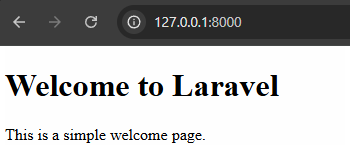
Route Files
routes/web.php: For web routes with stateful features like sessions and CSRF protections (useswebmiddleware group).routes/api.php: For stateless API endpoints, prefixed with/apiand comes with rate limiting andapimiddleware.
Redirect & View Routes
Redirect Routes: Quickly redirect one route to another.
Route::redirect('/here', '/there');
View Routes: Serve a Blade view without a controller method.
Route::view('/welcome', 'welcome');
(or)
Route::get('/welcome', function () {
return view('welcome');
});
Route Parameters
Capture dynamic values from the URL:
Required Parameter:
Route::get('/users/{id}', function ($id) {
return "User ID: " . $id;
});
Output:
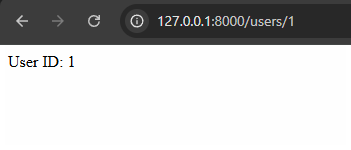
Optional Parameter:
Route::get('/users/{name?}', function ($name = null) {
return "User name: " . ($name ?? 'no name');
});
| Output with name | Output without name |
|---|---|
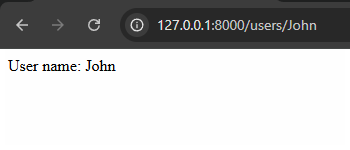
|
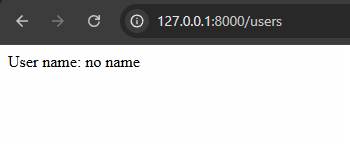
|
Constraints with Regex:
Route::get('/users/{id}', function ($id) {
return "User ID: " . $id;
})->where('id', '[0-9]+');
| Output with id(0-9) | Output with id(a) |
|---|---|
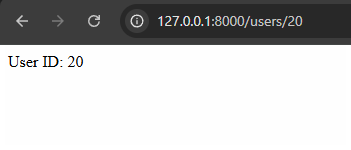
|
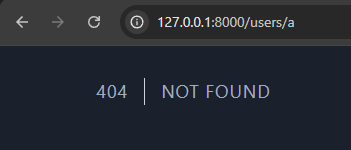
|
Named Routes
Gives routes a name for easier referencing elsewhere:
Route::get('/users/{id}', function ($id) {
return "User ID: " . $id;
})->name('user.profile');
Can access
<a href="{{ route('user.profile', 5) }}">
John Deo
</a>
Route Groups
Group your routes for common properties like prefixes:
Route::prefix('admin')->name('admin.')->group(function () {
Route::get('/dashboard', function(){
return view('dashboard')
})->name('dashboard');
});
Can access:
http://my-app.test/admin/dashboard
(Or)
<a href="http://my-app.test/admin/dashboard">
Dashboard
</a>
(Or)
<a href="{{ route('admin.dashboard') }}">
Dashboard
</a>
Fallback Routes
Catch-all route for unmatched URIs:
Route::fallback(function () {
return view('errors.404');
});
Rate Limiting
Define custom rate limiters and attach them to routes:
use Illuminate\Cache\RateLimiting\Limit;
use Illuminate\Support\Facades\RateLimiter;
RateLimiter::for('uploads', function ($request) {
return Limit::perMinute(10);
});
Route::post('/upload', ...)->middleware('throttle:uploads');
List All Routes
To view all registered routes:
php artisan route:list
Add --columns for filtering:
php artisan route:list --method=GET // Filter by method: php artisan route:list --name=dashboard // Filter by route name: php artisan route:list --path=api/user // Filter by URI path: php artisan route:list --sort=uri // Sort routes by URI: php artisan route:list --reverse // reverse route list